Related Research Articles
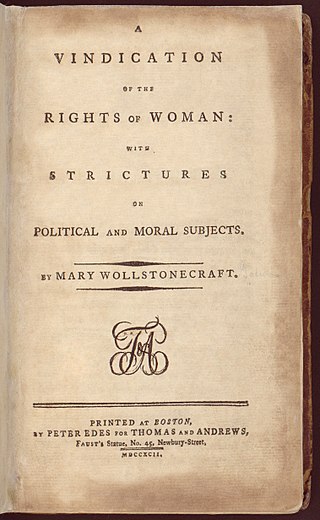
A Vindication of the Rights of Woman: with Strictures on Political and Moral Subjects (1792), written by British philosopher and women's rights advocate Mary Wollstonecraft (1759–1797), is one of the earliest works of feminist philosophy. In it, Wollstonecraft responds to those educational and political theorists of the eighteenth century who did not believe women should receive a rational education. She argues that women ought to have an education commensurate with their position in society, claiming that women are essential to the nation because they educate its children and because they could be "companions" to their husbands, rather than mere wives. Instead of viewing women as ornaments to society or property to be traded in marriage, Wollstonecraft maintains that they are human beings deserving of the same fundamental rights as men.
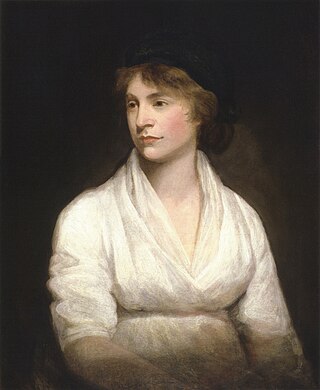
Mary Wollstonecraft was a British writer, philosopher, and advocate of women's rights. Until the late 20th century, Wollstonecraft's life, which encompassed several unconventional personal relationships at the time, received more attention than her writing. Today Wollstonecraft is regarded as one of the founding feminist philosophers, and feminists often cite both her life and her works as important influences.

Sense and Sensibility is the first novel by the English author Jane Austen, published in 1811. It was published anonymously; By A Lady appears on the title page where the author's name might have been. It tells the story of the Dashwood sisters, Elinor and Marianne as they come of age. They have an older half-brother, John, and a younger sister, Margaret.
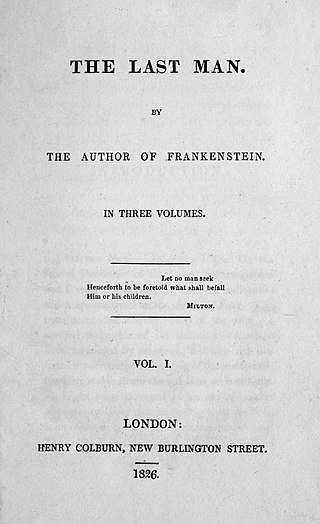
The Last Man is an apocalyptic, dystopian science fiction novel by Mary Shelley, first published in 1826. The narrative concerns Europe in the late 21st century, ravaged by the rise of a bubonic plague pandemic that rapidly sweeps across the entire globe, ultimately resulting in the near-extinction of humanity. It also includes discussion of the British state as a republic, for which Shelley sat in meetings of the House of Commons to gain insight to the governmental system of the Romantic era. The novel includes many fictive allusions to her husband Percy Bysshe Shelley, who drowned in a shipwreck four years before the book's publication, as well as their close friend Lord Byron, who had died two years previously.
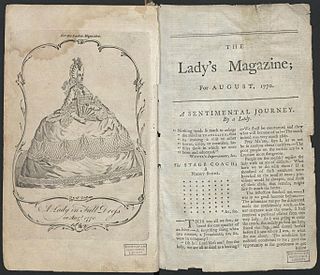
The Lady's Magazine; or Entertaining Companion for the Fair Sex, Appropriated Solely to Their Use and Amusement, was an early British women's magazine published monthly from 1770 until 1847. Priced at sixpence per copy, it began publication in August 1770 by the London bookseller John Coote and the publisher John Wheble. It featured articles on fiction, poetry, fashion, music, and social gossip and was, according to the Victoria and Albert Museum, "the first woman's magazine to enjoy lasting success."
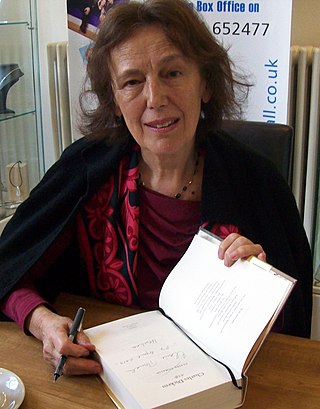
Claire Tomalin is an English journalist and biographer known for her biographies of Charles Dickens, Thomas Hardy, Samuel Pepys, Jane Austen and Mary Wollstonecraft.

Jane West (1758–1852), was an English novelist who published as Prudentia Homespun and Mrs. West. She also wrote conduct literature, poetry and educational tracts.
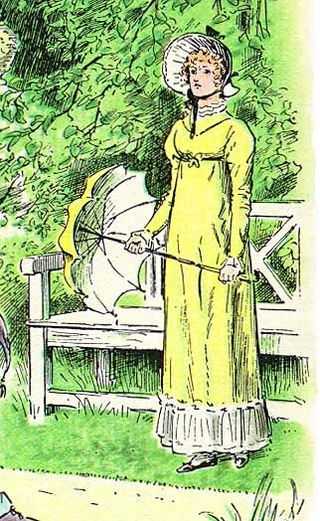
Elizabeth Bennet is the protagonist in the 1813 novel Pride and Prejudice by Jane Austen. She is often referred to as Eliza or Lizzy by her friends and family. Elizabeth is the second child in a family of five daughters. Though the circumstances of the time and environment push her to seek a marriage of convenience for economic security, Elizabeth wishes to marry for love.
Mary Hays (1759–1843) was an autodidact intellectual who published essays, poetry, novels and several works on famous women. She is remembered for her early feminism, and her close relations to dissenting and radical thinkers of her time including Robert Robinson, Mary Wollstonecraft, William Godwin and William Frend. She was born in 1759, into a family of Protestant dissenters who rejected the practices of the Church of England. Hays was described by those who disliked her as 'the baldest disciple of [Mary] Wollstonecraft' by The Anti Jacobin Magazine, attacked as an 'unsex'd female' by clergyman Robert Polwhele, and provoked controversy through her long life with her rebellious writings. When Hays's fiancé John Eccles died on the eve of their marriage, Hays expected to die of grief herself. But this apparent tragedy meant that she escaped an ordinary future as wife and mother, remaining unmarried. She seized the chance to make a career for herself in the larger world as a writer.
Janet Margaret Todd is a British academic and author. She was educated at Cambridge University and the University of Florida, where she undertook a doctorate on the poet John Clare. Much of her work concerns Mary Wollstonecraft, Jane Austen, and their circles.

Mary: A Fiction is the only complete novel by 18th-century British feminist Mary Wollstonecraft. It tells the tragic story of a woman's successive "romantic friendships" with a woman and a man. Composed while Wollstonecraft was a governess in Ireland, the novel was published in 1788 shortly after her summary dismissal and her decision to embark on a writing career, a precarious and disreputable profession for women in 18th-century Britain.

Valperga: or, the Life and Adventures of Castruccio, Prince of Lucca is an 1823 historical novel by the Romantic novelist Mary Shelley, set amongst the wars of the Guelphs and Ghibellines.

Maria: or, The Wrongs of Woman is Mary Wollstonecraft's unfinished novelistic sequel to her revolutionary political treatise A Vindication of the Rights of Woman (1792). The Wrongs of Woman was published posthumously in 1798 by her husband, William Godwin, and is often considered her most radical feminist work.

Thoughts on the education of daughters: with reflections on female conduct, in the more important duties of life is the first published work of the British feminist Mary Wollstonecraft. Published in 1787 by her friend Joseph Johnson, Thoughts is a conduct book that offers advice on female education to the emerging British middle class. Although dominated by considerations of morality and etiquette, the text also contains basic child-rearing instructions, such as how to care for an infant.
Claudia L. Johnson is the Murray Professor of English Literature at Princeton University; she is also currently chairperson of the English department. Johnson received her PhD from Princeton University; she specializes in Restoration and 18th century British literature, with an especial focus on the novel. She is also interested in feminist theory and gender studies. Johnson is renowned for her books on Jane Austen and Mary Wollstonecraft.
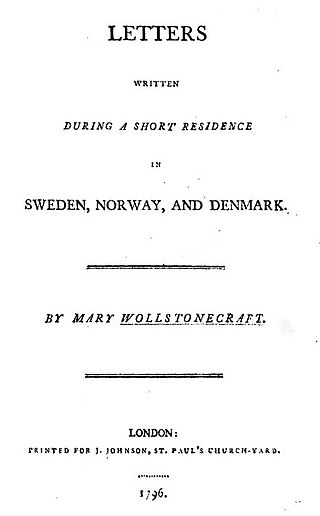
Letters Written During a Short Residence in Sweden, Norway, and Denmark (1796) is a personal travel narrative by the eighteenth-century British feminist writer Mary Wollstonecraft. The twenty-five letters cover a wide range of topics, from sociological reflections on Scandinavia and its peoples to philosophical questions regarding identity. Published by Wollstonecraft's career-long publisher, Joseph Johnson, it was the last work issued during her lifetime.
Falkner (1837) is the penultimate book published by the author Mary Shelley. Like Shelley's earlier novel Lodore (1835), it charts a young woman's education under a tyrannical father figure.
Jane Austen's (1775–1817) distinctive literary style relies on a combination of parody, burlesque, irony, free indirect speech and a degree of realism. She uses parody and burlesque for comic effect and to critique the portrayal of women in 18th-century sentimental and Gothic novels. Austen extends her critique by highlighting social hypocrisy through irony; she often creates an ironic tone through free indirect speech in which the thoughts and words of the characters mix with the voice of the narrator. The degree to which critics believe Austen's characters have psychological depth informs their views regarding her realism. While some scholars argue that Austen falls into a tradition of realism because of her finely executed portrayal of individual characters and her emphasis on "the everyday", others contend that her characters lack a depth of feeling compared with earlier works, and that this, combined with Austen's polemical tone, places her outside the realist tradition.

Mary Wollstonecraft Shelley was an English novelist who is best known for writing the Gothic novel Frankenstein; or, The Modern Prometheus (1818), which is considered an early example of science fiction. She also edited and promoted the works of her husband, the Romantic poet and philosopher Percy Bysshe Shelley. Her father was the political philosopher William Godwin and her mother was the philosopher and women's rights advocate Mary Wollstonecraft.
Rachel M. Brownstein is an American feminist literary critic, author, and academic.
References
- 1 2 Poovey, Mary (1976). The novel as imaginative order (Ph.D. thesis). University of Virginia. OCLC 2812233.
- ↑ "Mary Poovey". english.fas.nyu.edu. New York University.
- ↑ Poovey, Mary (1985). The proper lady and the woman writer: ideology as style in the works of Mary Wollstonecraft, Mary Shelley, and Jane Austen . Chicago: University of Chicago Press. ISBN 9780226675282. Preview.
- ↑ Handler, Richard; Segal, Daniel (1999). Jane Austen and the fiction of culture : an essay on the narration of social realities (Updated ed.). Lanham, Md.: Rowman & Littlefield. p. 14. ISBN 0847690482.
- 1 2 Wagner, Tamara. Antifeminism and the Victorian Novel. Cambria Press. p. 25. ISBN 1621969797.
- ↑ "Two new honorary doctors at Uppsala University's Faculty of Social Sciences - Uppsala University, Sweden". www.uu.se. Retrieved 2016-02-02.